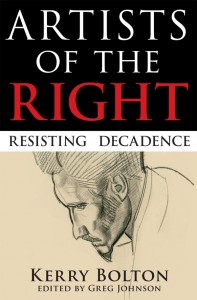Remembering J. R. R. Tolkien:
January 3, 1892–September 2, 1973
Greg Johnson
“I am in fact a Hobbit.”—J. R. R. Tolkien
John Ronald Reuel Tolkien is a favorite author of New Left “hippies” and New Right nationalists, and for pretty much the same reasons. Tolkien deeply distrusted modernization and industrialization, which replace organic reciprocity between man and nature with technological dominion of man over nature, a relationship that deforms and devalues both poles.
But philosophically and politically, Tolkien was much closer to the New Right than the New Left. Tolkien was a conservative and a race realist. His preferences ran toward non-constitutional monarchy in the capital and de facto anarchy in the provinces, but he recognized that state control can be minimized only in a society with a deep reverence for tradition and a high regard for individual honor and self-restraint.

You can buy Kerry Bolton’s Artists of the Right here.
Many of Tolkien’s most fervent New Right admirers are neo-pagans. But Tolkien himself was a devout Roman Catholic traditionalist, albeit one with a deep love of pre-Christian myth, epic, and tradition. And although The Hobbit and The Lord of the Rings, with their many themes from Norse and Celtic mythology, resonate especially with pagans, the ultimate mythological framework of Middle Earth, particularly as expressed in the posthumous work The Silmarillion, is biblical in inspiration, with a creator God (Eru Ilúvatar), a devil (Melkor), a fall, and even a hint of the necessity of a divine incarnation to save creation.
In honor of Tolkien’s birthday, I wish first to draw your attention to several works on this website:
- Aquilonius, “Why the Left Hates The Lord of the Rings“
- Britannicus, “J. R. R. Tolkien: Master of Middle Earth” (German translation here, French translation here)
- William de Vere, “The Rangers of the North“
- Alex Graham, “Tolkien and the Kalevala“
- Alex Graham, “Tolkien’s Last Book: The Fall of Gondolin“
- Robert Hampton, “Who’s Ready for Black Elves in Middle Earth?“
- Greg Johnson, “The Scouring of the Shire” (Translations: Danish, Portuguese)
- Greg Johnson, Hyperborean Home (French translation here)
- Trevor Lynch, The Fellowship of the Ring, movie review
- Trevor Lynch, The Two Towers, movie review
- Trevor Lynch, The Return of the King, movie review
- Trevor Lynch, The Hobbit: An Unexpected Journey, movie review
- Trevor Lynch, The Hobbit: The Desolation of Smaug, movie review
- Trevor Lynch, The Hobbit: The Battle of Five Armies, movie review
- Spencer J. Quinn, “Tolkien: A Review“
- Fenek Solère, “The Unknown Soldier: Geoffrey Bache Smith, Tolkien’s Inspiration“
- Fenek Solère, “John M. Bowers’Tolkien’s Lost Chaucer”
- Fenek Solère, “Remembering Christopher Tolkien, 1924–2020“
- Will Windsor, “The Lord of the Rings: Return of the Meme“
For more background on Tolkien’s life and work, I recommend two introductory books, which are accessible even to teenagers: Leslie Ellen Jones’ Myth and Middle-Earth: Exploring the Medieval Legends Behind J. R. R. Tolkien’s Lord of the Rings and Bradley Birzer’s J. R. R. Tolkien’s Sanctifying Myth: Understanding Middle-Earth. The most thorough and serious biography and overall interpretation of Tolkien is Joseph Pearce’s Tolkien: Man and Myth.
For those who need no introduction, there is no better commemoration than to spend a winter evening snug in one’s own Hobbit hole reading the works of the man himself (or watching Peter Jackson’s masterly and inspiring movies of The Lord of the Rings).
* * *
Counter-Currents has extended special privileges to those who donate $120 or more per year.
- First, donor comments will appear immediately instead of waiting in a moderation queue. (People who abuse this privilege will lose it.)
- Second, donors will have immediate access to all Counter-Currents posts. Non-donors will find that one post a day, five posts a week will be behind a “paywall” and will be available to the general public after 30 days.
To get full access to all content behind the paywall, sign up here:
Paywall Gift Subscriptions
 If you are already behind the paywall and want to share the benefits, Counter-Currents also offers paywall gift subscriptions. We need just five things from you:
If you are already behind the paywall and want to share the benefits, Counter-Currents also offers paywall gift subscriptions. We need just five things from you:
- your payment
- the recipient’s name
- the recipient’s email address
- your name
- your email address
To register, just fill out this form and we will walk you through the payment and registration process. There are a number of different payment options.
Remembering%20J.%20R.%20R.%20Tolkien%3A%20January%203%2C%201892%E2%80%93September%202%2C%201973
Enjoyed this article?
Be the first to leave a tip in the jar!
Related
-
Counter-Currents Radio Podcast No. 586: British Pop Culture in the 1990s, Part 2
-
Counter-Currents Radio Podcast No. 585: British Pop Culture in the 1990s, Part 1
-
Notes on Plato’s Alcibiades I Part 3
-
Counter-Currents Radio Podcast No. 584: The Counter-Currents Book Club — Jim Goad’s Whiteness: The Original Sin
-
Nowej Prawicy przeciw Starej Prawicy, Rozdział 6: Znaczenie filozofii dla zmiany politycznej
-
Nowej Prawicy przeciw Starej Prawicy, Rozdział 5: Refleksje nad Pojęciem polityczności Carla Schmitta
-
Remembering Bill Hopkins
-
Nowej Prawicy przeciw Starej Prawicy, Rozdział 4: Teoria i praktyka

8 comments
Just like we’ll never experience the siege of Minas Tirith, nor come to the rescue with the blinding light of the White mage, the horror producing author of the trilogy has given us sth very special. I prefer it to dickens and rewatch it if time allows. Movies obv novels seem like childs play these days.
I’ll never forget reading LOTR for the first time when I was 19. A truly awesome and memorable literary experience. What really sucks about it all is that I suspect I am too hardened and cynical to enjoy it if I were to be introduced to it now in my advanced decrepitude.
Tolkien is a name of Türkic origin. The word tolqyn means “wave”. His orcs are based on ancient Türks. Not on real historical Türks, of course, but on ancient European impressions and stereotypes about Türks – Huns, Avars, Cumans and Tatars.
Salam,
I have a question not related to the subject at hand.
How do you see the imposition of Cyrillic and Roman scripts on the Turkic family of languages? Has it been beneficial or damaging?
I look forward to your reply.
Salam,
You know the first Türkic alphabet was Orhun/Orkhon script or Köktürk Runes (written from right to left). But some Türkic peoples used after it some other script systems. For example the Uyghurs used so-called Brahmi Script 1, then Brahmi-Script-2, than Sogdean and Manichean Script. And only later on the base of Arabian script (with Persian modification) they invented middle-aged Uyghur-Chaghatay script.
In the Russian Empire the Türkic peoples used Arabian scripts, and after the Bolshevik Revolution there was Yanalif, a new alphabet, based on Roman script, like in Türkey of Atatürk. Yanalif was introduced officially in the Soviet Türkic Republics in 1928. (The language reform of Atatürk was in 1928 too.) Ten years later Yanalif was replaced by Cyrillic script. Now Yanalif is not used.
I would say Arabian letters are not quite good for Türkic sounds. Cyrillic has its faults, because not for all sounds exist Cyrlillic letters. So for some vocals one need to use diphtongs оь/уь, and not only this. Now almost all former Türkic Republics of the USSR use Roman scripts, not Cyrillic. The Türkics in Russia still use Cyrillic. Personally I would prefer the introduction of Roman/Atatürk´s script for all them. Any possible return to the Arabian/Persian script would be wrong, as I think.
I see. That’s a helpful summary. Thanks.
I would say Arabian letters are not quite good for Türkic sounds.
Do you hold this true for every member of the Turkic language family?
Muhammad-Hossein Shahriar Tabrizi’s poetic work in Azeri flows quite beautifully in the Arab-Persian script.
But that’s how I see it. I am still a beginner. I don’t claim any authority on the subject.
Eastern Türkic peoples, for example, in Siberia or on Altai Mountains have never used Arabian/Persian scripts. Well, they have never been Muslsms too. They hold either ancient beliefs, based on Tengrism/Tengricilik, or are Buddhists.
Azeri Türkler were more under Persian influence, more than Anatolians themselves, and more than Uzbeks. It is quite clear than Azeris and Uzbeks and their poets used Persian scripts (and Persian language too, for example Babur, an Uzbek from Fargana, wrote his poems and memoirs both in Čaġatay and – less – in Persian). So when I say that the Arabian letters are not quite good for Türkic sounds, I do not mean that they are bad for poets and writers. They simply are someway difficult for practical use for the peoples which have abandoned Arabian scripts in 1920´s – i.e. the Türks from the former USSR and the Türks from Türkey. When some peoples still use Arabian/Persian/Čaġatāy letters, as Uyghurs do, it´s OK. But I do not think that Tatars, Qazaqs, Nogays, Uzbeks, Azeris, Alan-Karaçaylar, Qumyqs etc. and Anatolian Türks, who use Roman and Cyrillic scripts since almost 100 years would want to return to Arabian letters.
This is an interesting perspective.
Once again teşekkürler for taking the time and sharing your views.
Comments are closed.
If you have Paywall access,
simply login first to see your comment auto-approved.
Note on comments privacy & moderation
Your email is never published nor shared.
Comments are moderated. If you don't see your comment, please be patient. If approved, it will appear here soon. Do not post your comment a second time.
Paywall Access
Lost your password?Edit your comment